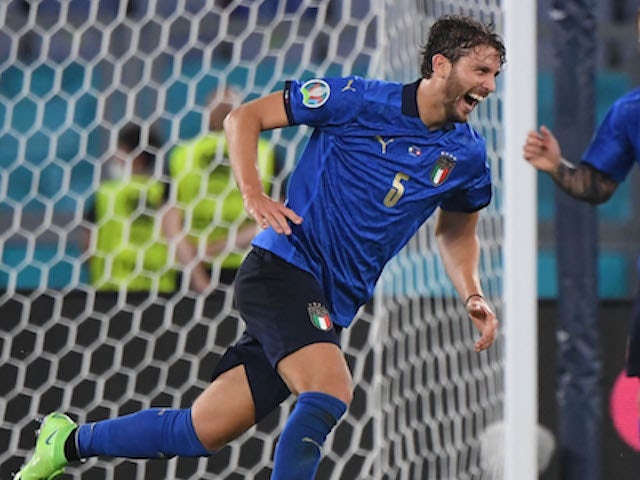Having emerged as one of the tournament favourites, Italy meet unfancied Austria at Wembley on Saturday, in the last 16 of Euro 2020.
While the Azzurri's sparkling start to the championships has continued a record-equalling unbeaten run, the Austrians are into the knockout phase for the first time ever, after finally ending their Euros drought with two group-stage wins.
Match preview

Keeping expectations in check may be Italy's most difficult task heading into the latter stages of this summer's European Championships, as an 11th win in a row last time out helped them extend their undefeated streak to a total of 30 games. Tying a national record set back in the 1930s under legendary coach Vittorio Pozzo, the 1-0 victory over Wales was scant reward for their shadow side's complete domination last Sunday.
Roberto Mancini managed to keep his team's momentum going despite wholesale changes - with eight of the previous starting XI dropping out - to claim maximum points once again, following back-to-back 3-0 victories over Turkey and Switzerland.
However, their prize for cruising through as winners of Group A is a place in the more challenging side of the draw, as they will face Belgium or Portugal in the next round should they progress, and then potentially France, Spain or Croatia in a semi-final.
First, though, La Nazionale must leave their Roman stronghold at Stadio Olimpico to meet Austria on neutral turf. Nonetheless, they will travel north in the knowledge that no Italian team has lost to their neighbours since 1960, and they have emerged as winners in each of the nations' four major tournament meetings.
Yet to concede a goal in the competition, a clearly united squad - in which even substitute goalkeeper Salvatore Sirigu has been awarded a handful of minutes - have not only proved an entertaining prospect for neutrals, but also shown they are made of stern stuff at the back. In fact, the last time Italy failed to keep a clean sheet was in a 1-1 draw with the Netherlands last October - over 1,000 minutes of football ago.
The four-time world champions have now reached ten straight wins for only the second time in their illustrious history - the first such streak having come during qualifying - and have not lost at all since 2018, so are in pole position to sweep past their Alpine counterparts this weekend.
 © Reuters
© Reuters
With the odds already stacked against them due to a gulf in world ranking and historic stature, Austria will potentially tackle their first-ever knockout fixture in European Championship history with few partisan fans present at 'the home of football'.
Earlier this week, their football federation urged supporters not to travel to London for the clash with Italy, after they unsuccessfully attempted to have the match moved from England due to health and safety concerns.
As there is also a quarantine requirement for Austrians travelling to and from London, the prospect of Das Team being roared on by thousands of success-starved fans may be diminished, but they will at least arrive there having risen to the challenge of escaping Group C by beating Ukraine last time out.
While Austria would still have qualified along with their opponents had they drawn, in the end they deserved to win by more than just Christoph Baumgartner's first-half goal, which left coach Franco Foda enthused about his team's unprecedented achievement.
After the match, Foda noted that his squad had been determined "to write history" and progress through the first stage of any major tournament for the first time since their notorious 1982 World Cup campaign.
In fact, the former West Germany international has hardly taken a wrong step while at the helm; guiding the Austrians to League A promotion in the Nations League and through the Euro 2020 qualifiers since his appointment at the start of 2018.
The Mainz-born tactician now leads his adopted nation into a tantalising last-16 encounter, still seeking to offer his star man David Alaba a settled role in the side.
Wherever he plays, the Real Madrid-bound 29-year-old - known for his versatility which has seen him play at left-back, in central midfield and on either flank - will be essential to his country's hopes of causing a seismic upset on Saturday evening. Having tasted Wembley glory once before in 2013, when Bayern beat Dortmund there in the Champions League final, the captain's presence may even be enough to keep the Austrian dream alive.
- W
- W
- W
- W
- W
- W
- W
- W
- W
- W
- L
- W
- L
- L
- D
- W
- L
- W
Team News
 © Reuters
© Reuters
Though Italy have maintained an impressive run without conceding, their defensive plans are again likely to be disrupted by injury on Saturday, as captain Giorgio Chiellini trained separately from the rest of the squad during the week. Full-back Alessandro Florenzi could only undertake individual gym work, so neither man may be fit to face Austria.
Therefore, Giovanni Di Lorenzo is expected to pip Atalanta's Rafael Toloi to start on the right side of the back four, with either Alessandro Bastoni or Francesco Acerbi joining Leonardo Bonucci in the centre.
Roberto Mancini also has a selection dilemma in midfield, as Marco Verratti confirmed his recovery from an ongoing knee issue in the win over Wales, but in-demand Sassuolo man Manuel Locatelli previously starred in the first two matches. Only one can start in the central triumvirate, alongside certain selections Jorginho and Nicolo Barella.
Up front, Ciro Immobile, Domenico Berardi and Lorenzo Insigne are the favoured three, though Federico Chiesa was named UEFA's 'Star of the Match' against Wales and will at least expect to be offered a run-out in the second half.
Meanwhile, Austria's lineup is far from certain, after coach Franco Foda successfully ditched his previous back three against Ukraine, allowing David Alaba to get forward more from left-back.
Their 4-2-3-1 formation in Bucharest also saw controversial striker Marko Arnautovic recalled after serving a one-match ban for insulting another player, but it remains to be seen whether they will be brave enough to persist with a more adventurous formation.
Julian Baumgartlinger, Martin Hinteregger and Valentino Lazaro are all injury doubts ahead of the trip to England, so Foda could alternatively choose to bring Stefan Ilsanker into the XI; switching back to a three-man rearguard, with Alaba returning to central defence.
Midfielder Christoph Baumgartner is fit to start after suffering a blow to the head against Sweden, so should start alongside RB Leipzig star Marcel Sabitzer in support of lone striker Arnautovic.
Italy possible starting lineup:
Donnarumma; Di Lorenzo, Acerbi, Bonucci, Spinazzola; Barella, Jorginho, Verratti; Berardi, Immobile, Insigne
Austria possible starting lineup:
Bachmann; Lainer, Dragovic, Hinteregger, Alaba; Laimer, Grillitsch, X. Schlager; Sabitzer, Baumgartner; Arnautovic

We say: Italy 2-0 Austria
Undoubtedly, the impetus will be on Italy to create chances and dictate the tempo against obdurate opponents, but they are well versed at probing patiently and then striking with clinical accuracy.
Even if Austria can thwart them for the first hour or so, the Azzurri can turn to the likes of pacy winger Federico Chiesa to make the difference from the bench, so should seal progress in the end.
Top tip
Data Analysis
Our analysis of all available data, including recent performances and player stats up until an hour before kickoff, suggested the most likely outcome of this match was a Italy win with a probability of 48.23%. A win for Austria had a probability of 27.71% and a draw had a probability of 24.1%.
The most likely scoreline for a Italy win was 2-1 with a probability of 9.48%. The next most likely scorelines for that outcome were 1-0 (9.28%) and 2-0 (7.79%). The likeliest Austria win was 1-2 (6.86%), while for a drawn scoreline it was 1-1 (11.28%).










